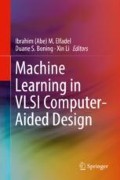Abstract
Modern semiconductor manufacturing is highly automated and generates a large amount of data with every wafer and process step. There is an increasing interest in machine learning and data mining techniques to improve yield to take advantage of this increasing volume of data. In this chapter, we introduce machine learning yield models for integrated circuit (IC) manufacturing yield enhancement. Challenges in this area include class imbalance due to high manufacturing yield, and concept drift due to the time-varying environment. We present batch and online learning methods to tackle the imbalanced classification problem, and incremental machine learning frameworks to overcome concept drift. We consider the packaging and testing process in chip stack flash memory manufacturing as an application. By testing our methods on real data from industry, we show the possibility of packaged memory yield improvement with machine learning-based classifiers detecting bad dies before packaging. Experimental results show significant yield improvement potential. In a time-invariant environment, for stacks of eight dies, we can achieve an approximately 9% yield improvement. In a longer period of time with realistic concept drift, a naive approach using a fixed false alarm rate-based decision boundary is shown to fail to improve yield. In contrast, with optimal thresholds, our incremental learning approach achieves approximately 1.4% yield improvement in the eight-die stack case and 3.4% in the 16-die stack case.
Access this chapter
Tax calculation will be finalised at checkout
Purchases are for personal use only
References
A. Kusiak, Rough set theory: a data mining tool for semiconductor manufacturing. IEEE Trans. Electron. Packag. Manuf. 24(1), 44–50 (2001)
C.K. Shin, S.C. Park, A machine learning approach to yield management in semiconductor manufacturing. Int. J. Prod. Res. 38(17), 4261–4271 (2000)
S.M. Weiss, A. Dhurandhar, R.J. Baseman, Improving quality control by early prediction of manufacturing outcomes, in Proceedings of the 19th ACM SIGKDD International Conference on Knowledge Discovery and Data Mining (2013), pp. 1258–1266
H. Chen, D.S. Boning, Online and incremental machine learning approaches for IC yield improvement, in IEEE/ACM 36th International Conference on Computer-Aided Design (2017)
H. Chen, Novel machine learning approaches for modeling variations in semiconductor manufacturing, Master’s thesis, Massachusetts Institute of Technology, 2017
N. Japkowicz, S. Stephen, The class imbalance problem: a systematic study. Intell. Data Anal. 6(5), 429–449 (2002)
A. Tsymbal, The problem of concept drift: definitions and related work, Technical Report, vol. 106, no. 2, Computer Science Department, Trinity College Dublin, 2004
N.A. Arnold, Wafer defect prediction with statistical machine learning, Master’s thesis, Massachusetts Institute of Technology, 2016
Y. Sun, A.K. Wong, M.S. Kamel, Classification of imbalanced data: a review. Int. J. Pattern Recognit. Artif. Intell. 23(04), 687–719 (2009)
H. He, E.A. Garcia, Learning from imbalanced data. IEEE Trans. Knowl. Data Eng. 21(9), 1263–1284 (2009)
Y. Freund, R.E. Schapire, Experiments with a new boosting algorithm, in ICML, vol. 96 (1996), pp. 148–156
C. Seiffert, T.M. Khoshgoftaar, J. Van Hulse, A. Napolitano, RUSBoost: a hybrid approach to alleviating class imbalance. IEEE Trans. Syst. Man Cybern. Part A Syst. Humans 40(1), 185–197 (2010)
H. Zhang, B. Yu, E.F. Young, Enabling online learning in lithography hotspot detection with information-theoretic feature optimization, in IEEE/ACM 35th International Conference on Computer-Aided Design (2016)
B. Wang, J. Pineau, Online bagging and boosting for imbalanced data streams. IEEE Trans. Knowl. Data Eng. 28(12), 3353–3366 (2016)
N.C. Oza, Online bagging and boosting, in IEEE International Conference on Systems, Man and Cybernetics, 2005, vol. 3 (2005), pp. 2340–2345
T.R. Hoens, R. Polikar, N.V. Chawla, Learning from streaming data with concept drift and imbalance: an overview. Prog. Artif. Intell. 1(1), 89–101 (2012)
G. Ditzler, R. Polikar, Incremental learning of concept drift from streaming imbalanced data. IEEE Trans. Knowl. Data Eng. 25(10), 2283–2301 (2013)
R. Elwell, R. Polikar, Incremental learning of concept drift in nonstationary environments. IEEE Trans. Neural Netw. 22(10), 1517–1531 (2011)
S.R. Safavian, D. Landgrebe, A survey of decision tree classifier methodology. IEEE Trans. Syst. Man Cybern. 21(3), 660–674 (1991)
J. Van Hulse, T.M. Khoshgoftaar, A. Napolitano, Experimental perspectives on learning from imbalanced data, in Proceedings of the 24th ICML (2007), pp. 935–942
Acknowledgements
We thank SanDisk Semiconductor (Shanghai) Co. Ltd. (SDSS) for assistance and support. We also thank Professor Roy Welsch from MIT Sloan School of Management, and Honghong Chen, Fangfang You, Wenting Zhang, and Yew Wee Cheong from SDSS for helpful discussions.
Author information
Authors and Affiliations
Corresponding author
Editor information
Editors and Affiliations
Rights and permissions
Copyright information
© 2019 Springer Nature Switzerland AG
About this chapter
Cite this chapter
Chen, H., Boning, D.S. (2019). Machine Learning Approaches for IC Manufacturing Yield Enhancement. In: Elfadel, I., Boning, D., Li, X. (eds) Machine Learning in VLSI Computer-Aided Design. Springer, Cham. https://doi.org/10.1007/978-3-030-04666-8_6
Download citation
DOI: https://doi.org/10.1007/978-3-030-04666-8_6
Published:
Publisher Name: Springer, Cham
Print ISBN: 978-3-030-04665-1
Online ISBN: 978-3-030-04666-8
eBook Packages: EngineeringEngineering (R0)

